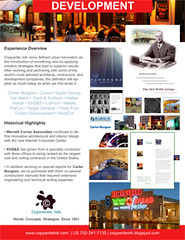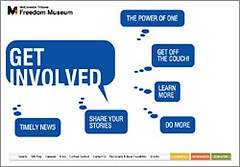When I provide copywriting overviews to public relations professionals at UNLV, I always enjoy walking them through the ad classic "Nine Ways To Improve A Volkswagen Ad," which covers nine ways to 'improve' (destroy) the classic "Think Small" ad designed years ago.
That might change. I recently saw a brilliant brand parody on Google Video that takes viewers on a funny (but disturbing) redesign of proven iPod packaging to make it look like a Microsoft product. Similar to the Volkswagen parody, this one tosses in a dozen alleged Microsoft marketing rules that ultimately destroy any sense of brand appeal.
If you work in advertising, you really need to see this (and then promise not to do it) ... Microsoft Branding Parody.
The timing is relevent as Apple releases its new iPod Nano packaging that smartly takes minimalism to the extreme. Meanwhile, Microsoft launches its MP3 player knockoff, tentatively named Zune. The product certainly looks like an obvious iPod copy, but we're still wondering if the packaging, which even some Microsoft execs make fun of, will have any appeal before holiday shopping season starts.
Sure, when it comes to writing and designing great ads, there are a few suggestions that hold true more often than not. I won't list them here, but instead will say that all of them are superceded by one rule: there are NO RULES in advertising (unlike public relations, which has many).
Too many rules in advertising, as some people like to spout out about, and you'll end up just like the video parody above. One big mess.
That might change. I recently saw a brilliant brand parody on Google Video that takes viewers on a funny (but disturbing) redesign of proven iPod packaging to make it look like a Microsoft product. Similar to the Volkswagen parody, this one tosses in a dozen alleged Microsoft marketing rules that ultimately destroy any sense of brand appeal.
If you work in advertising, you really need to see this (and then promise not to do it) ... Microsoft Branding Parody.
The timing is relevent as Apple releases its new iPod Nano packaging that smartly takes minimalism to the extreme. Meanwhile, Microsoft launches its MP3 player knockoff, tentatively named Zune. The product certainly looks like an obvious iPod copy, but we're still wondering if the packaging, which even some Microsoft execs make fun of, will have any appeal before holiday shopping season starts.
Sure, when it comes to writing and designing great ads, there are a few suggestions that hold true more often than not. I won't list them here, but instead will say that all of them are superceded by one rule: there are NO RULES in advertising (unlike public relations, which has many).
Too many rules in advertising, as some people like to spout out about, and you'll end up just like the video parody above. One big mess.




















